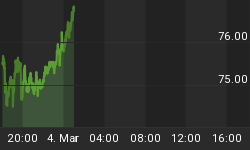God must love typical investors; he created so many of them. But he cursed the poor yahoos to mediocrity. They can't get 'alpha' (above market performance), say the theorists, because they can never know as much as the market itself.
For the average investor, it is true; he can do no better than average. Match his little wits against 'the market'? Don't make us laugh.
You can hear a lot of laughing in the City and on Wall Street lately. And this week, the cynical cackles came from the Blackstone Group, which offered to sell common investors 10% of the company for $4 billion.
Here we back-track for a moment with an observation: The major decision that any stock market investor has to make is which line of guff to fall for. Any of them will ruin you - but some faster and more thoroughly than others.
One of the finest pieces of guff ever - the Efficient Market Hypothesis - is probably one of the least harmful. EMH tells us that market prices incorporate all the information available at any given moment - infinitely more information than any individual investor could hope to assimilate. Logically (if idiotically) any extra value an investor sees in a share is thus incorrect, compared to the price actually set by the all-seeing market.
It is impossible to beat the market, declares EMH. Of course, it is not true. But it also may not be true that you will go to jail if you kill someone. Still, it's not a bad idea to believe it.
Meanwhile, for 20 years, Blackstone Group has been doing to the market approximately what Tyson did to Holyfield. It's profits in 2006 reached $2.27 billion, more than double that of the previous year.
Obviously, the professors of EMH got it wrong somewhere.
While the academics say you can't beat the market, the financial industry makes it sound as though you almost can't help beating it. For a fee, mutual funds, account managers, stockbrokers, hedge funds and private equity groups offer to help you trounce the average investor.
Of course, that's the business we're in, too, here at the Daily Reckoning. But our pitch is extremely modest: If you don't like our ideas and suggestions, you can ask for a refund.
Compare that to the chutzpah of the hedge fund industry, which charges 2% of capital and 20% of performance. If the professors are right, investors who go into hedge funds are morons. If the results are purely random - as EMH insists - they're just giving away their money. If the returns bounced up 100% one year and down 50% the next, over a decade, almost all your money would be taken away in fees.
But then, the chutzpah seemed to reach a peak when hedge funds began offering shares to the public. If a hedge fund manager really could get enough 'alpha' to justify the fees, why would he want to give it away to perfect strangers? Hedge fund managers can do math. They wouldn't sell shares of their own fund unless they could get a premium. As we explained earlier this week, either the public was willing to pay more for alpha than alpha was worth, or, there really wasn't any alpha at all.
It turned out that hedge fund alpha had vanished. No one seemed to know where it went, but when they toted up hedge fund performance, over the last two years, they found that they were no better than the average mutual fund...and no better than the average, mediocrity-chasing lumpen investor.
Then, alpha was spotted hanging around with Private Equity capital, which soon became the hottest thing on Wall Street.
And now comes the pitch:
"Pssst," says the Blackstone Group. "You still want alpha? Buy our shares."
Is the Blackstone Group a religious or charitable order? Not so far as we have heard. If they have any alpha, they are not going to give it away. Already, they give investors in their private funds about the same deal as the hedge funds - 2 and 20, 2% of capital, 20% of profits. And now, like the hedge funds, they are proposing to sell their moneymaking magic to the poor fellows in the public market.
Exactly what public investors will get, we don't know. It's a private company. And the prospectus for its new offer is not out yet.
What we know is that private equities, like hedge funds, have taken on a speculative mentality. Deals are put together...then flipped from one PE firm to another. The objects of their attention - actual, profit-making companies - are loaded down with debt so the private equity investors can take out the profits. And then, the deals are sold back to the public - at a big premium. As more and more money chases quick profit, standards slip; the deals degenerate...from super-prime to subprime. Until investors come to their senses.
In 1989, it was junk bond dealers with alpha in their pockets who were in need of wising up. Then, Ohio Mattress was being taken private by a buyout firm just at the time Drexel Burnham collapsed. Lenders got worried...then frightened. All of a sudden, the easy credit that made the deal possible disappeared. First Boston, one of the lenders, reached into its pocket and...lo...no more alpha. The deal fell apart and the bank was so destabilized, it was later sold to Credit Suisse.
Junk bond investors learned such a valuable lesson, it took them almost 10 years to forget it.
Regards,















